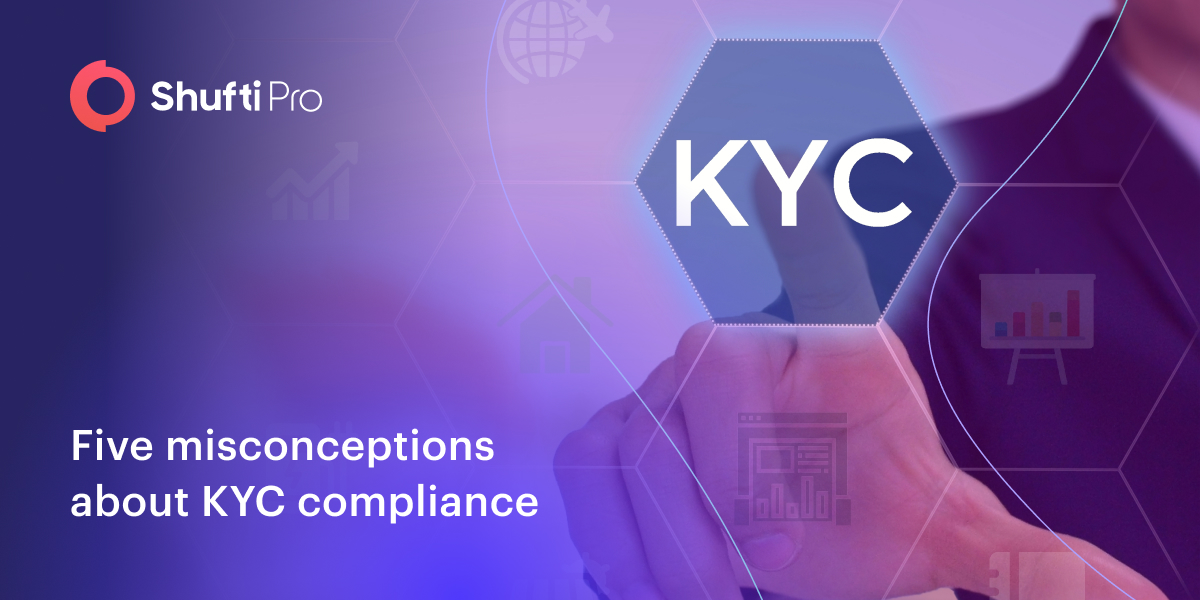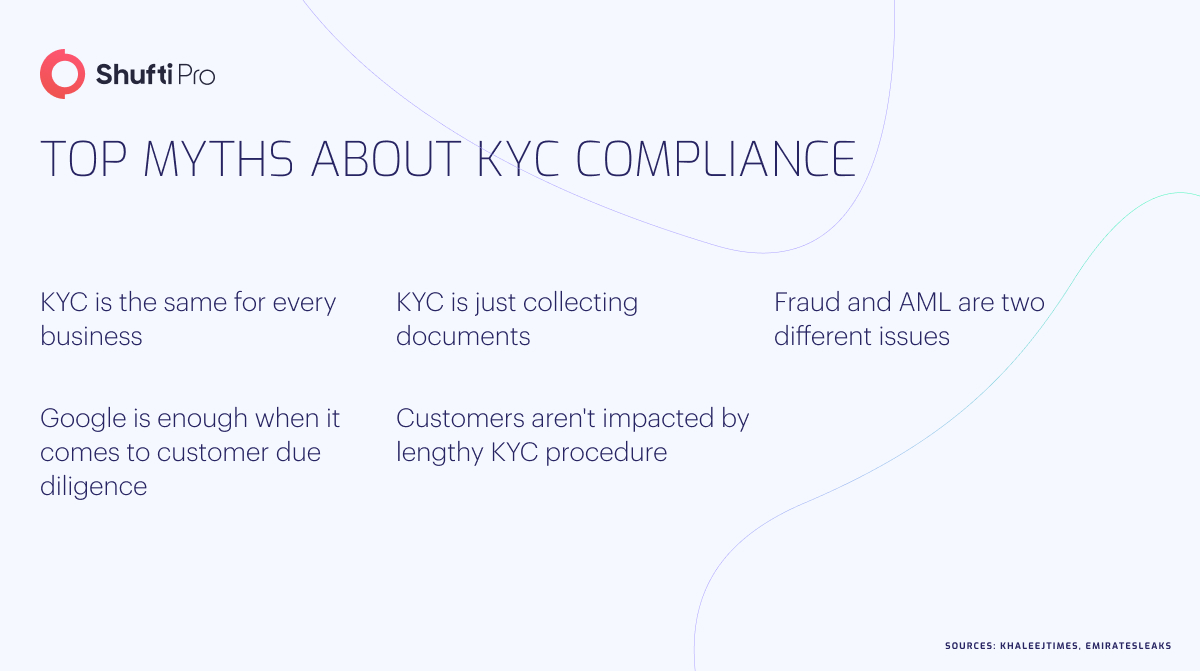Debunking the Top 5 Misconceptions about KYC Compliance

- 01 What is KYC Compliance?
- 02 Myth# 1: KYC is the Same for Every Business
- 03 Myth# 2: KYC is Just Collecting Documents
- 04 Myth# 3: Fraud and AML are Two Different Issues
- 05 Myth# 4: Google is Enough When it Comes to Customer Due Diligence
- 06 Myth# 5: Customers aren't Impacted by Lengthy KYC Procedure
- 07 Debunking the Myths
Know Your Customer (KYC) compliance suffers from the issue of unintentional secrecy. Businesses have to meet KYC and AML obligations but keeping up with best practices is becoming more challenging day by day.
KYC is not just going down the list and labelling tasks as done – it’s actually more than that. By misunderstanding KYC, firms not only fail to adapt to the changing landscapes but also expose themselves to reputational risks and hefty penalties.
What is KYC Compliance?
KYC compliance is legally binding for financial institutions to identify and verify customers before onboarding them. It is necessary to assess the risk that a customer can pose to any firm or other clients. Performing KYC during client onboarding reduces the risk of identity theft and makes businesses secure.
Adhering to KYC compliance not only protects firms from money laundering and other financial crimes but also prevents them from paying heavy fines. In other words, KYC compliance helps firms make their mark in the competitive world market.
Here are the top 5 myths about KYC compliance and truths clearing misconceptions to keep companies safe and sound.

Myth# 1: KYC is the Same for Every Business
A ‘one size fits all’ always raises concerns when it comes to KYC compliance. Obligated organisations must comply with domestic and international standards depending on clients, operations, products, and jurisdictions. Moreover, AML compliance differs from country to country with more stringent standards for jurisdictions with deficient or poor AML laws.
The degree of KYC and Customer Due Diligence (CDD) that a business performs must be proportional to the risk level that the clients present. KYC is never the same for everyone as high-risk customers must undergo Enhanced Due Diligence (EDD) and verify their funds’ sources. Although KYC differs for every business but has a common goal i.e. to adhere to AML regulations and curb financial crime.
Myth# 2: KYC is Just Collecting Documents
Many think that KYC is as simple as collecting someone’s identity documents. However, to run an effective KYC-compliant program, one must monitor activities, conduct a risk assessment, and determine the source of income.
In addition to this, screening against legal, regulatory, and criminal watchlists is something more than just collecting ID documents. As KYC is the first step, it must be performed accurately. Otherwise, it would cause more harm than good.
Myth# 3: Fraud and AML are Two Different Issues
Financial firms such as banks usually operate two large and complex units, fraud and AML, to identify and prevent financial crime. Although both historically lie in different departments, regulators believe that they are connected to an extent that their boundaries might be blurred.
It is not only fraud that is a big issue but criminal gangs are also involved in human trafficking, drug trafficking and other heinous crimes that involve fraud and AML.
While fraud is of different typologies, it should be tackled holistically. Thus, identifying and authenticating Ultimate Beneficial Owners (UBOs) is a good point to begin.
Myth# 4: Google is Enough When it Comes to Customer Due Diligence
Google is the go-to option for everyone in today’s modern era, but getting information when needed is crucial in KYC and CDD compliance. How much time does one waste on google while doing an adverse media check? Do they go through the first 10 matches only? How much time does one spend going through pages with important and relevant information missing?
Not all the details are available on Google. For instance, one can not gain access to legal records or corporate documents from any foreign country using Google where the individual has to go in person to collect the documents. AML and KYC compliance is data hungry discipline that requires accurate, structured, clean data to nourish its engine and search engines like Google are never sufficient to get the same job done.
Regulatory authorities need timely access to legal and accurate information. For this, they use multiple libraries and repositories to gather primary and secondary source information used in CDD and KYC examinations. Unreliable or outdated data do not reveal risks fully and sometimes even miss red flags that indicate criminal activity. Thus, it is good to use relevant information from a direct source to avoid getting exposed to regulatory risks.
Myth# 5: Customers aren’t Impacted by Lengthy KYC Procedure
In this competitive environment, fintech and financial firms compete over costs and client experience. What customers want is to spend less time completing the KYC process and also expect the procedure to run seamlessly.
However, clunky, lengthy, and cumbersome KYC verification processes badly impact firms. Outdated KYC checks not only result in a lousy customer experience but also results in financial loss.
Swift onboarding is the key factor that either brings customers towards a business or away from that. The average time to onboard any client is approximately 26 days. What is worrying is that more than 73% of financial companies lose clients due to complicated and lengthy KYC procedures. Lower conversion rates and high abandonment put a dent in the business’s reputation. Thus, it is a bitter truth that clients are impacted by lengthy AML/KYC checks and expect them to be streamlined to complete.
Looking for an online KYC solution that takes less than a second? Shufti’s KYC identity verification is your go-to option.
Debunking the Myths
Is the KYC process working properly, or has it fallen trapped to misconceptions? If so, it’s high time to debunk the myths before it puts the organisation and customers at risk. Recognising that they are just misconceptions would unlock more robust strategies to prevent money laundering, terrorism financing, and other shady activities. Above all, recognising the truth behind KYC/AML will satisfy customers and boost the company’s revenue.
Still have any queries on how a KYC solution works?

 Explore Now
Explore Now













